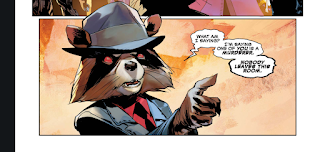Guardians of the Galaxy #1-8
Originally released in 2020
Written by Al Ewing
Art by Juan Cabal (#1-5), Marcio Takara (#6-8)
I realized that I haven't read anything by Al Ewing yet, and as I liked his work on Immortal Hulk and The Ultimates, and I knew that he had done a run on the Guardians of the Galaxy, I figured this also worked as an opportunity to try to get back into cosmic Marvel. This worked as a better starting point than Annihilation for me, though there was still a LOT going on at first.
There's a Kree civil war, multiple members of the Guardians of the Galaxy are from other universes, there's talk of something called the Cancerverse, Drax used to be a human saxophone player... it's a lot to take in right off the bat, though the series does become easier to follow as time goes on.
One thing that I enjoyed is how Al Ewing deftly avoids the problems of a series being interrupted by a company's latest line-wide crossover, either by having an issue focusing on a side story or by having a one-page epilogue that covers how they got to the event in question. Compared to yesterday's reading of Justice League Dark, it made it easier to just follow one series and get a story from that, rather than needing to read three series and several one-off tie-in books to understand what's happening.
After a tragic incident while fighting off the reborn (and insane) Greek pantheon, the Guardians split into two separate teams, with neither one really liking the other. Both teams have a Moondragon - one from the main Marvel universe (Earth-616) is Drax's reincarnated daughter, who is suffering from identity issues given that the other Moondragon is from an alternate universe where everything is perfect and she's happily married to Phyla-Vell, one of the former Captain Marvels. (the main universe's Phyla-Vell is dead)
While trying to stop the Greek gods, they find and rescue Hercules (who wasn't reborn, and remains a hero), who joins Rocket's team of Guardians. He gets into a relationship with Noh-Varr, a Kree super-soldier from another universe who represents a separatist faction of the Kree.
In addition, Nova (Richard Rider, the leader of the Nova Corps. and one of its two members as far as he knows - it's just him and Sam Alexander from the Champions) has been going through therapy after everything he's been going through. (and possibly comes to a realization about his love life, though it's ambiguous) There's a lot going on, needless to say.
Rocket Raccoon leads one team of Guardians, while Gamora leads the other, though they both come together by the later issues. The teams are rounded out by Star Lord and Groot, though their roles are comparatively minor. (They have some good moments, though)
One of the highlights for me was Moondragon's struggle with comparing herself to her alternate universe counterpart. Usually, at least in my experience with comics, alternate universes tend to be worse off in some way compared to the "main" universe, as seen with the Council of Reeds in Hickman's Fantastic Four run. However, in this case, the other Moondragon is an idealized version of herself, better in seemingly every way.
This causes the main Moondragon plenty of issues that the alternate Moondragon tries to help her with, culminating in the two of them fusing together. This greatly simplifies things from a writing standpoint (since now there's only one Moondragon), though it complicates her romance with Phyla-Vell. (Since Moondragon didn't mention anything to her wife before merging with the main universe's Moondragon)
The last few issues deal with an entertaining storyline - a murder mystery at a peace conference that happens after the Empyre event. When Noh-Varr is accused of murdering several diplomats, it's up to Rocket to solve the case. Unfortunately, Rocket's taken to drinking after the aforementioned tragic incident, which doesn't help Noh-Varr's chances.
It made for a fun whodunnit storyline, though a major part of the reasoning for the culprit was something that was lost on me due to my unfamiliarity with cosmic Marvel. (It involved one race being extremely isolationist and/or xenophobic to the point where they normally wouldn't attend the peace negotiations)
I enjoyed the book, though with the alternate universe duplicates and callbacks to previous events, I feel like it's hard to recommend it as a jumping-on point for cosmic Marvel. (I'm only vaguely familiar with some of the events that were referenced, such as the Cancerverse being a universe where Mar-Vell didn't die of cancer, causing Death to die and Cthulhu-like monstrosities to run rampant) I should sit down one of these days and research a good place to begin with cosmic Marvel, rather than picking somewhat blindly.
















No comments:
Post a Comment